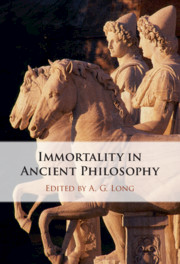Book contents
- Immortality in Ancient Philosophy
- Immortality in Ancient Philosophy
- Copyright page
- Contents
- Contributors
- Introduction
- Chapter 1 The Soul and the Celestial Afterlife in Greek Philosophy before Plato
- Chapter 2 Pythagorean Immortality of the Soul?
- Chapter 3 The Philosopher’s Reward: Contemplation and Immortality in Plato’s Dialogues
- Chapter 4 Pre-Existence, Life after Death, and Atemporal Beings in Plato’s Phaedo
- Chapter 5 The Immortal and the Imperishable in Aristotle, Early Stoicism, and Epicureanism
- Chapter 6 Socrates and the Symmetry Argument
- Chapter 7 Immortality in Philo of Alexandria
- Chapter 8 Plotinus on Immortality and the Problem of Personal Identity
- Chapter 9 Truth and Immortality in Augustine’s Soliloquies and De Immortalitate Animae
- Index of Passages
- Index of Names and Subjects
- References
Chapter 3 - The Philosopher’s Reward: Contemplation and Immortality in Plato’s Dialogues
Published online by Cambridge University Press: 20 May 2021
- Immortality in Ancient Philosophy
- Immortality in Ancient Philosophy
- Copyright page
- Contents
- Contributors
- Introduction
- Chapter 1 The Soul and the Celestial Afterlife in Greek Philosophy before Plato
- Chapter 2 Pythagorean Immortality of the Soul?
- Chapter 3 The Philosopher’s Reward: Contemplation and Immortality in Plato’s Dialogues
- Chapter 4 Pre-Existence, Life after Death, and Atemporal Beings in Plato’s Phaedo
- Chapter 5 The Immortal and the Imperishable in Aristotle, Early Stoicism, and Epicureanism
- Chapter 6 Socrates and the Symmetry Argument
- Chapter 7 Immortality in Philo of Alexandria
- Chapter 8 Plotinus on Immortality and the Problem of Personal Identity
- Chapter 9 Truth and Immortality in Augustine’s Soliloquies and De Immortalitate Animae
- Index of Passages
- Index of Names and Subjects
- References
Summary
In dialogues ranging from the Symposium to the Timaeus, Plato appears to propose that the philosopher’s grasp of the forms may confer immortality upon him. Whatever can Plato mean in making such a claim? What does he take immortality to consist in, such that it could constitute a reward for philosophical enlightenment? And how is this proposal compatible with Plato’s insistence throughout his corpus that all soul, not just philosophical soul, is immortal? In this chapter, I pursue these questions by applying the distinction between general and earned immortality to the Phaedo and the Symposium. I argue that, while Plato attributes general immortality to all souls in the Phaedo, he proposes in the Affinity Argument that the philosopher’s soul can achieve earned immortality through contemplating forms. It is this form of immortality that Plato claims is unavailable to humankind in the flux passage of the Symposium. At the same time, in the ascent passage, he holds out the possibility – albeit with significant reservations – that the philosopher’s soul may transcend its humanity and achieve earned immortality through its communion with the forms.
- Type
- Chapter
- Information
- Immortality in Ancient Philosophy , pp. 66 - 92Publisher: Cambridge University PressPrint publication year: 2021
References
- 2
- Cited by



